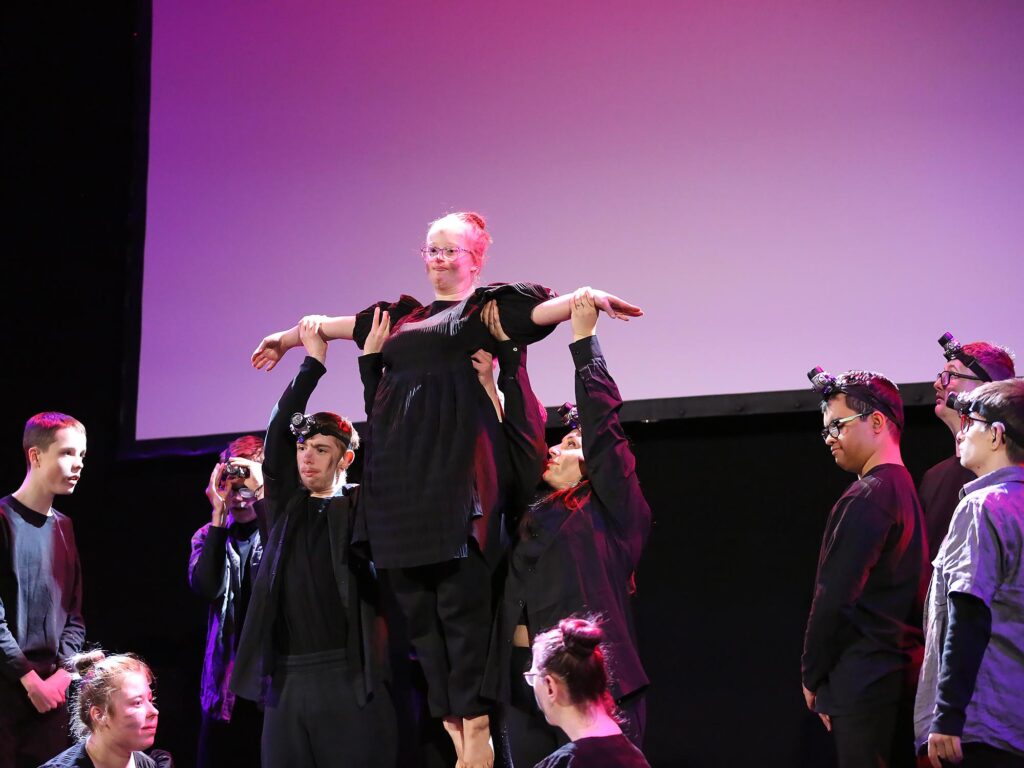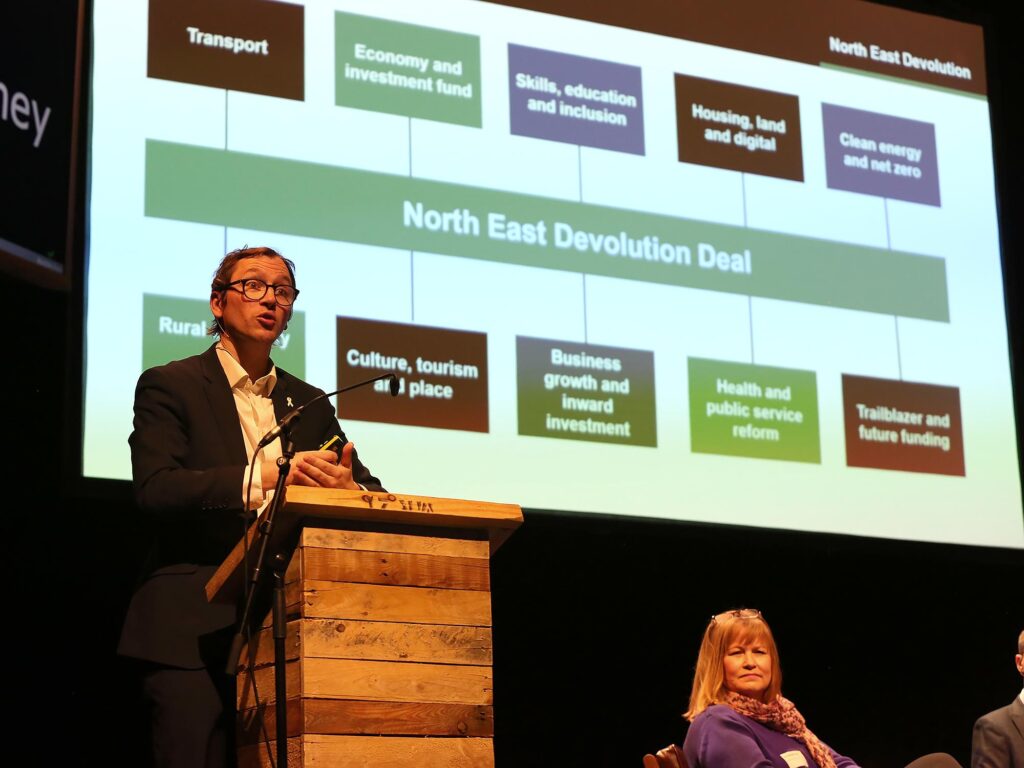
Five of the six candidates vying to be the first elected mayor of a huge swathe of the North East attended their first hustings at St Chad’s College, Durham, on Monday night.
It is reported about 100 people were there to hear them put their case, discussing issues including transport, green energy, schools, housing and employment.
Twice as many gathered nearby earlier in the day and would have been disappointed, though not surprised, to hear that culture did not figure prominently in the debate.
These were the delegates to the annual forum of the North East Culture Partnership (NECP), uniting the region’s local authorities, universities and cultural organisations in championing the creative sector. Formed in 2013, it’s still unique in the country.

Top of the agenda at Durham’s Gala Theatre was the devolution deal which is due to bring some £4.2 billion our way over the next 30 years, starting under the new mayor to be elected on May 2.
Among words of welcome, NECP co-chair Prof Jane Robinson, pro-vice chancellor of Newcastle University, pointed out that ‘culture is referenced at the heart of the devolution deal’ with the Government and spoke of its huge potential.
Despite what often felt like a ‘perma-crisis’ in national and international affairs, the creative sector had shown resilience and, in this region, ‘recent signs of recovery’ she said.
Prof Robinson hoped devolution would enable the sector to pioneer new ideas and showcase to others what can be achieved.
What does this mean for you guys, for the cultural sector? Culture is at the heart of this deal, that’s true. That is not fake news. It is a massive, massive opportunity.
Henry Kippin
She said the region was well placed to assess what worked because Newcastle University hosts the northern hub of the Creative Industries Policy and Evidence Centre (Creative PEC) whose work was endorsed last year with an £11m grant from the Arts & Humanities Research Council.
George Freeman, then minister of state at the Department of Science, Innovation and Technology, said at the time: “The creative industries are a UK success story, growing at double the rate of the overall UK economy between 2011 and 2019, with 400,000 additional jobs created since 2015.”
He added: “To make good, impactful policy decisions on how to support the creative industries and ensure the UK remains a world leader, we need robust evidence and independent advice.
“The Creative PEC is at the heart of these debates providing an impartial, reliable and challenging voice.”
Under the elected mayor of the new North East Mayoral Combined Authority (NEMCA) will be the council leaders of Newcastle, Gateshead, Northumberland, North Tyneside, South Tyneside, Sunderland and County Durham.

Each will hold a portfolio with culture, creative, tourism and sport going to Durham County Council which branded itself The Culture County during its bid to be UK City of Culture 2025.
“We came in the top four and that’s not a bad result in terms of the national picture,” Cllr Elizabeth Scott, who holds the council’s portfolio for economy and partnerships, told delegates.
She said the bid process had changed perspectives and thinking. “It made us think we are special — County Durham and the North East.”
- Read more: Where are all the women in a man’s world?
- Read more: Creating a culture of transformation
Recently the council has played a part in securing £1.25m from Arts Council England’s place partnership scheme for Into the Light, a three-year programme of events, activities and skills development across the county.
It demonstrated the council’s ability to make things happen, she said. But it seems it will now be helping to make them happen for others too.
“Historically in the North East we’ve seen each other as rivals but this (NEMCA) marks a point where we stop thinking that way and start really collaborating in ways that change people’s lives,” Cllr Scott said.
Dr Henry Kippin, chief executive of the North of Tyne Combined Authority and interim chief exec of NEMCA which will supersede it, said the North East devolution deal was the biggest in the country per head of population.

With about £500m of investment coming to the region on day one, he asked rhetorically: “What does that mean for culture?”
He said the NEMCA portfolios covered areas such as transport, finance, the rural economy, housing, education and culture.
“But the magic of how we do this lies between the lines in an integrated programme in which culture is fundamental to the economy, transport is fundamental to culture, the rural economy is fundamental to skills.
- Read more: My life through a lens: Steve Ellwood
- Read more: Wilde ride in store for theatre audiences
“We absolutely know that working together across these portfolios is key.
“What does this mean for you guys, for the cultural sector? Culture is at the heart of this deal, that’s true. That is not fake news. It is a massive, massive opportunity.”
Arts Council England is excited about the devolution deal, according to Paul Bristow, its director of strategic partnerships.
Culture, he said, had not been referenced specifically in earlier devolution deals but they had nevertheless provided the means for successful local initiatives to be “scaled up”.

“We’re really happy to see mayoral combined authorities thinking about the broad stretch of their responsibilities,” he said, adding that Arts Council England was working well alongside them.
Tom Frater, director of Historic England for the North East and Yorkshire, said: “One thing we’ll benefit from enormously is it gives us a bigger voice, a real national profile, and it creates an opportunity for a strategic alignment around an economic vision.
“It means being able to come up with a shared plan for what matters.”
Heritage and culture, he said, had a big part to play in terms of binding the wider North East together and making it attractive to young people.

“For a place like the North East, retaining our skilled young people and attracting them from outside is a key battle, I think,” added Tom.
Some young people took to the stage to open the forum’s afternoon session, their evident joy in performing and our pleasure in watching them a reminder of what arts and culture can do.
Aside from economic concerns, we all need this in our lives if they are to be remotely fulfilling.
The dancers from The Oaks Secondary School in Spennymoor, a school for young people with special educational needs, performed an immaculate routine to music by The Unthanks, ambassadors for all that is brilliant about the North East arts scene.
Expertly coached by Maria Mandehzadeh, of Durham-based TIN Arts, they paid homage to Spennymoor artist Norman Cornish, another jewel in our crown.
Other forum speakers addressed the challenges of achieving net zero carbon emissions— there’s scope for improvement in most areas of life, even culture — and better serving the many freelancers without whom most arts organisations would struggle to survive.
These issues, along with equity and inclusion and providing opportunities for young people, are championed by the NECP’s North East Case for Culture which is pushing for improvements in many aspects of sector working.
All speakers underlined the positives that could come with the new devolution deal.
For a place like the North East, retaining our skilled young people and attracting them from outside is a key battle.
Tom Frater, director of Historic England for the North East and Yorkshire
If the cultural sector gets just a small slice of the cake, it can make a huge difference to a lot of lives and not only in theatres, galleries and concert halls but for those who never venture near such places.
The resilience Jane Robinson spoke of is often testament to the cultural sector’s ability to make a little go a very long way.
As someone said towards the end of the day, all we have to do now is get out on May 2 and vote. A good turnout and a clear mandate on mayoral election day can get things off to a good start.

Barnard Castle’s Bowes Museum, resembling a French chateau, was commissioned by art collectors John and Josephine Bowes but neither lived to see it open in 1892










